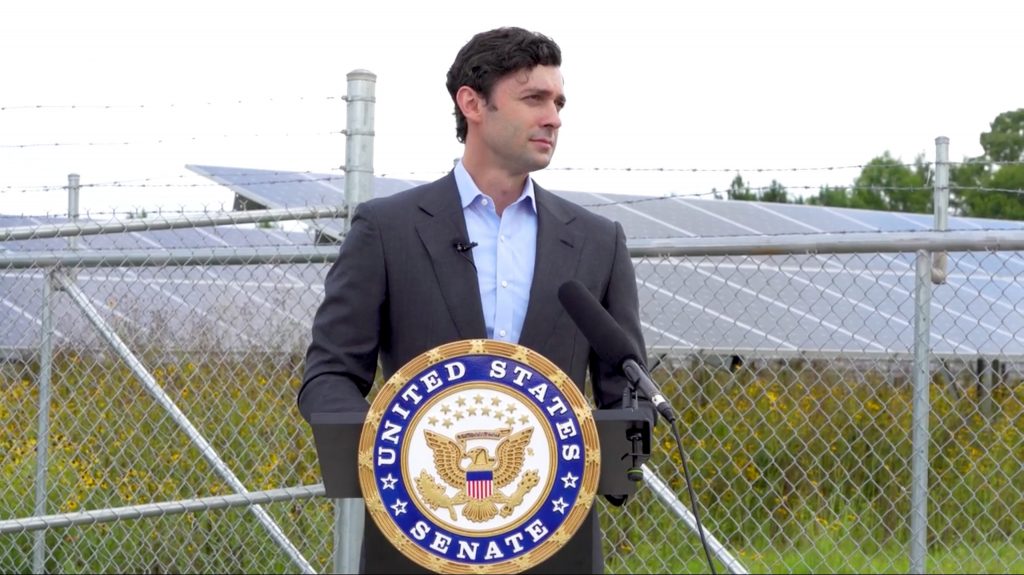“Sustainable Highways Innovation Act” will permit clean energy generation, high-speed internet transmission, and electric vehicle charging infrastructure on the empty spaces in America’s under-utilized highway rights-of-way
Days after introducing his solar manufacturing bill, Sen. Ossoff continues to lead on clean energy and infrastructure
Bill will allow states to make productive use of empty highway rights-of-way without impacting the safety and utility of the road as the primary use of the corridor
Watch announcement aquí.
West Point, Ga. — Today U.S. Senator Jon Ossoff announced theSustainable Highways Innovation Act, new legislation that will permit clean energy generation, high-speed internet transmission, and electric vehicle charging infrastructure on the empty spaces in America’s under-utilized highway rights-of-way.
These highway rights-of-way (ROW) include the mostly-empty land alongside highways and median zones.
Just days after introducing landmark legislation to boost America’s solar industry, today Sen. Ossoff announced a new bill to unlock millions of acres of unused public space along highways for infrastructure supporting the transition to clean energy, the mass adoption of electric vehicles, an upgraded and more secure power grid, and universal high-speed internet.
This bill allows State Departments of Transportation (state DOTs) to use interstate highway rights-of-way for renewable energy generation projects, like solar arrays; electrical transmission and distribution projects; broadband internet projects; and electric vehicle or other clean alternative fueling stations.
The bill also encourages states to manage highway rights-of-way with environmentally sound vegetative practices, like growing native grasses or pollinator meadows instead of turf grass.
Such uses will always prioritize the safety and utility of the road as the primary use of the corridor.
WATCH: Sen. Ossoff announces his new legislation here (please find B-roll from the visit at the end)

“I’m pleased to announce I will be introducing the Sustainable Highways Innovation Act in the United States Senate,” Sen. Ossoff said at the press conference. “This legislation will permit the use of under-utilized highway rights-of-way on interstate highways across the country for purposes like solar energy generation, for energy and data transmission to connect communities with broadband internet access, and for electric vehicle charging infrastructure.”
“My father, Ray C. Anderson, would be proud to see the advancement of this legislation,” said Harriet Anderson Langford, president and founder of The Ray. “Since our creation, The Ray has been inspired by the opportunity we saw in the underutilized land on our interstate roadsides. Our hope is by bringing ROW solar development forward, there will be a catalyst for future projects that unlock the full potential of U.S. ROW land. Like our solar megawatt on The Ray Highway, ROW solar projects also have the capability to repurpose the soil below as pollinator habitats for our bees and butterflies. Solar is only the beginning.”
“18.7 million passenger electric vehicles are expected to be on the roads in the U.S. by 2030. But existing U.S. infrastructure is unprepared to meet the demand of our future transportation energy needs,” said Allie Kelly, executive director of The Ray. “By utilizing empty ROW land with these build-ready projects, State DOTs win on day one by optimizing underutilized land to generate clean renewable energy that can power electrified transportation.”
The bill is similar to legislation introduced by Georgia Congresswoman Carolyn Bourdeaux (GA-07) in the U.S. House.
Under Sen. Ossoff’s bill, State DOTs would continue to own the rights-of-way, but could generate revenues via public-private partnerships for purposes specified by the bill.
This would allow state DOTs to:
- generate revenue;
- more efficiently utilize and maintain rights of way;
- upgrade and secure the electricity transmission and storage grid;
- produce renewable energy;
- reduce greenhouse gas emissions and other pollution;
- accelerate attainment of universal broadband access; and
- create new markets for new products made by American companies and workers.
Click here for a one-pager about the Sustainable Highways Innovation Act.
# # #